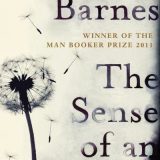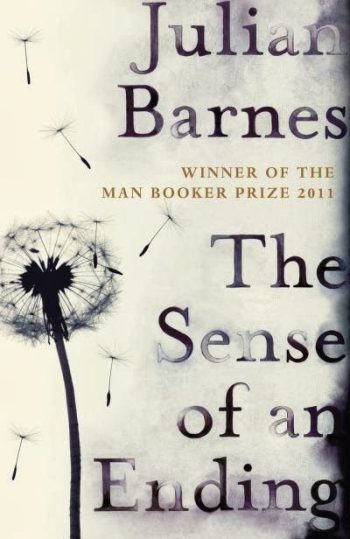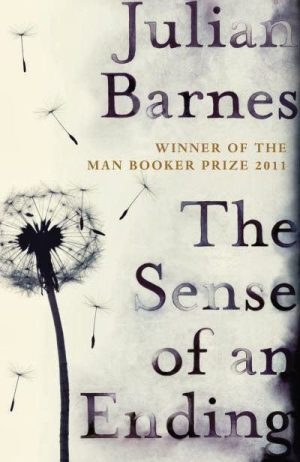The Sense of an Ending – Julian Barnes – 2011
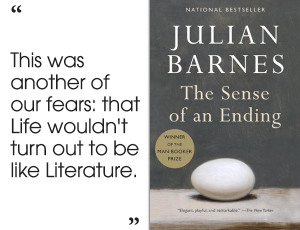
Posted by Lale on 6/2/2012, 9:24:45
I was disappointed. I did not think that this book was remarkable in any way. Maybe because neither Veronica, nor her mother had any character development. We really didn’t get to know either one of them. Adrian was a complete mystery as well. And I thought the narrator was just a tad annoying.
I didn’t like or dislike the book, I thought it was just unremarkable, easily forgettable. I had really liked Arthur and George. It was like Barnes did not put in the effort into this one.
So, what do you all think?
~
Posted by Sterling on 6/2/2012, 16:32:53
From my limited reading of Barnes, Arthur & George was a surprisingly conventional novel for a generally non-linear writer. I believe that The Sense of an Ending is much more typical of his work.
There is really only one character in the novel, the (unreliable) narrator. I can see how you would be disappointed in this book if you were hoping for well-developed characterizations.
I was fascinated by the developing suspense. Why the 500 pounds? Why leave the diary to Tony, and why wouldn’t Veronica let him have it? Who are the group of mentally handicapped? What doesn’t Tony understand? What does he not want to understand? Arranging the pieces and constructing an explanation was a major component of my enjoyment.
I thought that the plot was very skilfully developed in hints and asides. One of the major revelations of the novel is that Tony is essentially a supporting character in the largest dramas of his own life. We all see ourselves as the protagonist. Imagine discovering that you’re a bit part!
I was also particularly charmed by the device of introducing a series of images at the very beginning. It was fun to recognize the images in context
~
Posted by Steven on 8/2/2012, 9:08:24
I enjoyed the novel very much. Having reached the point of my life where memories predominate, I can strongly relate to his thesis about how we construct our own history, gradually turning fragmented and selective memories into a seemingly coherent and consistent story. I certainly hope nothing comes along that forces me to re-interpret my past the way Tony had to. It wouldn’t be worth the £500.
I had a nagging feeling that we’d read a similar story before, then it occurred to me yesterday that it was another Booker Prize winner, The Sea by John Banville. Look at all the similarities: an aging man now retired living alone; he has one child, a daughter; a youthful romance with a strong but unbalanced girl ending in a suicide; reconstructing and reliving his past, and finding that the girl’s mother was sexually involved with one of his friends. Of course there are huge differences in the two novels, most notably in Banville’s Nabokovian language.
The brevity and simplicity of The Sense of an Ending are a message to the reader, along with the narrator’s occasional comments such as “but that has no part in this story,” that everything he does mention is a clue. So when Veronica keeps harping at Tony “You still don’t get it,” she’s talking to the reader as well.
Incidentally, I would hate Veronica as a person (though I do agree with her about Tchaikovsky). I can’t stand people who say “you still don’t get it,” meaning “my way is the only way to see things” but won’t explain themselves.
What I still “don’t get,” though, is when Tony spends the night at the Fords’ house and Veronica arranges that he has breakfast alone with Mrs. Ford. Was Veronica pimping for Mom all along?
I still have lots of passages marked for discussion, but I’ll save those for later.
~
Posted by Lale on 8/2/2012, 13:35:45
I was also reminded of The Sea by Banville, which I had liked more.
I hate it when people say “you don’t understand.”
I did not like or enjoy this book at all. I didn’t think there was anything special about it. Now, reading your notes, I am thinking I may have missed a point due to utter indifference: was it ever revealed why the amount was 500 and not something else, say a 1000? I may have missed this because, really, the book could not make me care.
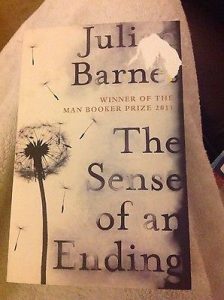
Posted by Sterling on 9/2/2012, 0:12:38
SPOILER****************SPOILER******************SPOILER*************SPOILER
I decided I wanted to freely address my take on the plot of The Sense of an Ending. I couldn’t help getting hung up on “solving” the plot, even though I suspect that Barnes is more interested in memory. As a psychologist, I can tell you that it is well established that our memories are narrative constructs we tell ourselves. If history is “that certainty produced when the imperfections of memory meet the inadequacies of documentation,” this story illustrates what happens when the “imperfections” of memory are confronted with more than “adequate” documentation. Tony tells himself that he has lived a calm, inoffensive, undramatic life. He sees himself as harmless and innocuous.
In Chapter One, he describes his letter to Adrian and Veronica: “As far as I can remember [!], I told him pretty much what I thought of their joint moral scruples.” Pretty mild, right? What a shock for him (and for the reader) when we get an opportunity to read the actual letter. The Tony that we “know” from the main text doesn’t seem to be the sort of person who has either the malice or the wit to write such a shockingly cruel letter. He has to cope with his youthful behavior. Like Steven, I certainly hope that I am never confronted by evidence that would rock my world and shatter my image of myself.
But there’s more: the page from Adrian’s diary. We can’t really decode it when it’s introduced. Only when we have already been provided with more pieces of the story can we interpret it.
a¹ is Adrian, a² is Anthony, s is Sarah, v is Veronica, and b is baby.
So:
baby = Sarah -Veronica + Adrian
Or, more significantly:
Anthony + Veronica + Adrian X Sarah = baby
In the morning when the others are out, Sarah, Veronica’s mother, does indeed make a pass at Tony. He is too innocent to recognize it. It doesn’t seem to occur to him that an older woman could find him attractive. He only sees that she is betraying her daughter by warning him about her.
I don’t know why the others are all out. I have a patient who was sexually abused for much of her childhood by both her father and her brother. She now feels intense shame that she enjoyed both the attention and the behavior itself when she was young. For a while, it created a “special bond” between the three of them, with her mother on the outside. Tony keeps believing that Veronica is “damaged,” and he even speculates on sexual abuse. By the time my patient was Veronica’s age, she felt horror and revulsion toward her father and brother and deep personal shame. But it doesn’t have to be that way. I have watched an adult woman fiercely defend her father who molested her and attack her mother who failed to protect her.
In any event, I believe that it is not possible that Veronica was pimping her boyfriends to her mother. If she were, then it would not follow that she would blame Tony for Adrian’s suicide. Adrian’s affair with her mother was behind Veronica’s back.
Tony wrote in his vicious letter: “Even her own mother warned me against her. If I were you, I’d check things out with Mum…Of course, you’ll have to do this behind Veronica’s back.” Considering what Veronica eventually learned about Adrian, she no doubt interpreted this as encouraging an affair between Adrian and her mother. Very likely, she believes that Tony did have sex with her mother that morning. Since the affair between Adrian and Sarah directly resulted in his suicide, Veronica calls the £500 “blood money.”
Mum seems to have been quite the tart. After her husband’s death, she moved to London and “took in lodgers” even though she did not need the rent money.
This is why Anthony is in the equation. All three, Adrian, Veronica, and Sarah, credit Anthony with bringing Adrian and Mum together. I also note that the baby is designated b, because the diary entry, and the suicide, precede the baby’s birth. He does not yet have a name.
Adrian kills himself when he realizes that he has made Veronica’s mother pregnant (at 40 or so). It is possible that the life described in the suicide note as “a gift bestowed without anyone asking for it” refers to the baby and not Adrian. (This may be reading in too much).
In any event, Adrian killed himself and Sarah gave birth to a retarded child–twin tragedies that Veronica blames directly on Tony. Consider in retrospect the cruelty of: “It would be unjust to inflict on some innocent foetus the prospect of discovering that it was the fruit of your [Adrian’s] loins.”
Sarah sent the £500 as a kind of thank you for introducing her to Adrian. This seems about the average amount of a small bequest of gratitude. Although she claims that she is “not sure of [her] own motives,” she intended Tony to have Adrian’s diary, which would explain the situation. Under the circumstances, I think it is perfectly understandable that Veronica would not let Tony have it.
I may have more thoughts, but I’ll save them for another time.
~
Posted by Steven on 9/2/2012, 10:24:52
Excellent remarks, Sterling! You obviously read the novel very closely and picked up some points I overlooked. My follow-up comments are below.
: In Chapter One, he describes his letter to Adrian and
: Veronica: “As far as I can remember [!], I told
: him pretty much what I thought of their joint moral
: scruples.” Pretty mild, right? What a shock for
: him (and for the reader) when we get an opportunity to
: read the actual letter.
I think adolescents are, in general, more blunt in their expressions and correspondingly more thick-skinned than mature adults. We would probably all be dismayed by how insensitive we were at that age. Tony, though, was still way out of line.
: Anthony + Veronica + Adrian X Sarah = baby
In his equation Adrian is simply expressing a chain of relationship, not implying any blame on Tony (or Veronica, for that matter). Most people don’t blame a failed relationship on the person who introduced them to the person who introduced them… Yet Veronica lashes out viciously at Tony as though this were all his fault. I suppose she is, in part, transferring her own feelings of guilt to the next person down the line.
: In the morning when the others are out, Sarah,
: Veronica’s mother, does indeed make a pass at Tony.
: He is too innocent to recognize it. It doesn’t seem
: to occur to him that an older woman could find him
: attractive.
This kind of goes along with a comment that I had flagged to the effect that “in the 60s most of us were still living in the 50s.” Nowadays the media promote the idea of mature women as sex objects, but back in the June Cleaver days your friend’s mother was as asexual as your own mother.
: I don’t know why the others are all out.
It would have to have been Sarah’s doing. She probably concocted a story for her family about wanting to screen this young man but told Veronica to say it was her own idea. Whether the family believed her at this point was questionable.
: Tony wrote in his vicious letter: “Even her own
: mother warned me against her. If I were you, I’d
: check things out with Mum…Of course, you’ll have to do
: this behind Veronica’s back.” Considering what
: Veronica eventually learned about Adrian, she no doubt
: interpreted this as encouraging an affair between
: Adrian and her mother. Very likely, she believes that
: Tony did have sex with her mother that morning.
Interesting point. Even if Veronica didn’t assume anything happened between Tony and Sarah, she still has evidence here to construct a conspiracy theory.
: Mum seems to have been quite the tart. After her
: husband’s death, she moved to London and “took in
: lodgers” even though she did not need the rent
: money.
I missed this one. Yet another clue laid in front of us by the author.
: Sarah sent the £500 as a kind of thank you for
: introducing her to Adrian. This seems about the
: average amount of a small bequest of gratitude.
: Although she claims that she is “not sure of
: [her] own motives,” she intended Tony to have
: Adrian’s diary, which would explain the situation.
I’m still unclear on Sarah’s motives. Everything depends on what the diary says that we never see. She’s kept it now for about 40 years, never contacting Tony and presumably aware that Veronica hasn’t either. Does she assume Tony knows about the baby? If not, she would have to realize that, far from being a “thank you,” her bequest would come as a huge shock to Tony. So perhaps there are passages in the diary that are very generous towards Tony, and that’s why vicious Veronica keeps it to herself. In which case Tony is having to turn loose of the memories out of which he selectively created a past and replace them with memories edited by Veronica.
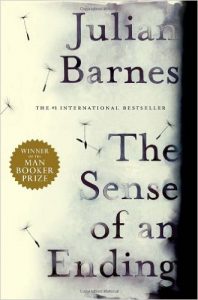
Posted by Guillermo Maynez on 13/2/2012, 13:16:47
Well, I did like the novel. This is Barnes’s fourth book I’ve read, and I’ve enjoyed them all: “Flaubert’s Parrot”, “A History of the World in 10 & 1/2 Chapters”, and “Arthur and George”. Very different books, indeed, and also different from “The Sense of an Ending”. I see that more than one among us was reminded of “The Sea”, for all their variations in story and style. Less than that, but I was also reminded of “The Bad Girl”, and Sandor Marai’s “Embers”. Have you noticed, as I have, that in most of contemporary fiction it is hard to find a really likable character? It is filled with melancholia, remorse, dark sexual secrets, abuse, betrayal, etc. I’m not regretting this, simply recording it from my own experience. Compare this with the recently read Dickens: although horrible things happen in his novels, and there are usually very dark secrets as background to the story, he has a way to relate them that doesn’t sound as depressing or hopeless… I don’t know, it’s just an impression I’ve been getting from readings of recent years.
Now, turning to our book, I also think it was very cleverly built, bit by bit and hint by hint. Steven and Sterling have, as always, provided close readings, overlooked incidents and hidden clues. Tony is certainly an unreliable narrator, a man who seems to be, in Pink Floyd’s words, “comfortably numb”: he’s OK with everything and everybody, gets along well with his cuckolding wife (I’m not deploring it, simply noticing it) and daughter, had a comfortable job with a comfortable retirement, and spends his time in a mild and useful pro-bono occupation. What is terrible in his life is, we deduct from his narration, not to blame on him. He fell in love with a domineering Alpha-female, a girl I wouldn’t have dated twice. Then he met the mother-in-law from hell and ran away (and, of course, kept a crush on Veronica). It was utterly predictable that, once she got to meet Adrian, she would fall for him, but it is only natural that, when you have a girlfriend, you want your pals to meet her (well, unless she is not presentable). And so it happened, and so Adrian met Sarah, and so Sarah, being the great mother she seems to be, goes to bed with Adrian.
Up to here, it’s just gossip. Heavy one, when one goes to bed with the girlfriend’s mother, but gossip. The tragedy is twofold: to learn about the retarded man, and to read his letter again, as you guys say, being forced to completely reshape his own image. I also hope there’s no skeleton in some closet which forces me to rethink my self. More later.
~
Posted by Steven on 14/2/2012, 9:10:07
: Have you noticed, as I have, that in most of
: contemporary fiction it is hard to find a really
: likable character? It is filled with melancholia,
: remorse, dark sexual secrets, abuse, betrayal, etc.
Yes, and even those who are likable are inevitably troubled. The struggle is within themselves rather than with external forces. I looked back at the books I had read in the last six months, and the only modern one with a likable protagonist (two, in fact) is 1Q84 by Haruki Murakami. But even these characters are deeply flawed.
: Tony is
: certainly an unreliable narrator, a man who seems to
: be, in Pink Floyd’s words, “comfortably
: numb”: he’s OK with everything and everybody,
That’s another trend in modern fiction: the passive male, paired in most cases with an assertive female.
~
Posted by Steven on 15/2/2012, 9:03:22
One of my friends on LibraryThing just finished reading The Sense of an Ending, and while he said it was a good book of its kind, he couldn’t believe that there weren’t other, meatier books deserving of the Booker Prize. (Of course, the entire shortlist was heavily criticized for being too influenced by readability=marketability.) This is, in part, what he said:
Just what was the selection criteria used by the Man Booker panel? I can only suppose it was something like this:
1) A well respected previously nominated author with at least ten published novels
2) A novel that can be read at one sitting, is not too heavy to read in bed and is under 150 pages long
3) Subject matter that would appeal to an over 60 reading group that is well represented on the judging panel – J B’s novel is perfect with its reflections on the passing of time and its nostalgia for times past
4) A final twist and a satisfactory tying up of loose ends so that the reader gets a sense of fulfilment when finishing.
5) It must be witty at all times with a couple of good jokes and any aphorisms should be repeated to ensure they hit the mark
6) There must be a time shift in the novel as its well known that most novels today have at least two parts.
7) There ought to be some cultural references – J B scores highly here with his naming of Donovan’s A gift from a flower to a garden. This shows good taste and some 60’s street cred.
8) Any difficult words or Latin phrases should be fully explained in the text, the reader should not be troubled with the chore of looking things up.
9) The novel must be well written with no annoying intertextuality or stylistic unevenness.
10) There should be no hint of experimentation, literary cleverness or any of that post modernism crap.
11) Unwritten criteria – A white male author over 60 would be acceptable to all panel members.
~
Posted by Steven on 16/2/2012, 9:35:34
: In the
: second, less scandalous, case, a writer named Jorge
: Volpi won the also prestigious prize Planeta-House of
: the Americas. He doesn’t seem to deserve it.
I have a book of his, In Search of Klingsor is the English title, but haven’t read it yet. Have you?

Posted by Guillermo Maynezon 16/2/2012, 18:04:10
I haven’t read Volpi. People in whose judgment I trust have not liked it, not one, and so, there being so many good books to read, I have let it pass. The title in English is a literal translation.
~
Posted by Sterling on 15/2/2012, 22:24:14
I’m sorry that your friend from the other group didn’t care for The Sense of an Ending. I suppose the numbered objections are intended to be amusing. I wasn’t amused. If he didn’t like it, he didn’t like it. But I don’t think he’s very close to the mark.
For example:
“Street cred” from Donovan’s A gift from a flower to a garden? Obviously, he must be a kid. If you’re old enough to understand the reference, you’re old enough to remember that that particular box set was a joke at the time. The ultimate in hippy-dippy drivel. The detail is inserted to indicate uncoolness and bourgeois taste.
If he were ever talked to an over-60 reading group, he would know how conservative they tend to be. The ladies I see who are in senior circle book clubs like Water for Elephants or The Help. They would hate The Sense of an Ending.
And, news flash, as an over-60 myself, I can tell you that I most certainly did not identify with anyone in the book. Guillermo is correct in his assessment of how unlikeable characters tend to be in the modern literary novel.
Jokes? Did you read any jokes? What jokes? I don’t think I even smiled while reading this.
“A satisfactory tying up of loose ends?” I think we’re pretty bright over here at ReadLit, and we’re all still trying to figure out what the heck happened in this novel, what with the hidden plot and unreliable narrator. I think there are frayed ends everywhere in this book. Indeed, the unreliability of memory is the theme of this novel!
Odd that he finds no “literary cleverness” here. Barnes is a recognized master of the non-linear novel. His literary sleight of hand is visible everywhere in The Sense of an Ending.
Does it deserve the Booker prize? I certainly don’t know. I think it was better than The Inheritance of Loss, though, a Booker prizewinner by a thirty-something woman of color!
~
Posted by Steven on 16/2/2012, 9:32:46
I’m sorry as well that he didn’t care for it, since it was on my recommendation that he read it. He probably is over 60, since he a retired Londoner living in the south of France. Of course, what’s conservative in his world would be liberal in ours.
Actually, looking back on the list of Booker winners, very few have had the attributes he seems to expect. Certainly The White Tiger was even lighter reading than The Sense of an Ending, if a bit longer. The Life of Pi can be read by a 12-year-old, and Vernon God Little was just silly.
Actually none of the major literary awards consistently recognizes challenging and cutting edge literary works.
~
Posted by Lale on 16/2/2012, 12:24:49
: Certainly The White Tiger was even lighter reading
: than The Sense of an Ending, if a bit longer. The Life
: of Pi can be read by a 12-year-old
Those two were truly original books and I love that in a book. I thought both were deserving of a major award.
~
Posted by Sterling on 17/2/2012, 21:32:24
: Actually none of the major literary awards
: consistently recognizes challenging and cutting edge
: literary works.
I agree with you, Steven, but to be frank, I don’t know where the “cutting edge” is these days.
Post-modernism? Well, maybe. Probably. But post-modernism has been around for about 50 years, since V. and The Sot Weed Factor. Indeed, the glory days of the pomo novel were probably the Sixties and Seventies. What really new has come along since? We all loved Wittgenstein’s Mistress, but even that more recent novel dates from 1988, a quarter century ago.
And it’s not just literature, either. Poking around the internet, looking at the 2010 Whitney Biennial, 21st century classical music, etc., all the arts seem to be at a loss for something new. They keep recycling ideas from the second half of the 20th century.
I don’t think any of us other than me listen to contemporary “alternative” rock, but even in the popular arts, it’s all self-referential. Everything sounds like music from 20-50 years ago.
Having said that, what may we consider new? What works do we believe “should” be winning awards? Jonathan Franzen and William T. Vollmann? If so, the National Book Award wins. 2666? (he shudders). Then, the National Book Critics Circle Award.
I notice that classical music seems to be experiencing a New Traditionalism with faux Romantic Era melodies. Some of the most recent highly regarded visual art is representational and “pretty.” Perhaps we’ve gone as far into the non-linear, intertextual, experimental novel as we can. Maybe the new “cutting edge” is found in a return to more traditional narratives that have been influenced and informed by all the experimentation of the past century.

Posted by Lale on 18/2/2012, 11:03:32
: We all loved Wittgenstein’s Mistress, but even that
: more recent novel dates from 1988, a quarter century
: ago.
A quarter century ago already? We are getting old so fast, it is spinning my head.
I may not know the definition of cutting edge, or it may be one of those things you recognize when you see it. If the latter, then in my opinion Wittgenstein’s Mistress was cutting edge and so was White Tiger.
I value originality, but I hate it when an author tries to sell crap disguised as creativity: a book without story, without characters, without plot, without value, without even entertainment, just crap, disgusting crap. Case in point (as I have said so many times before) Vaudeville by Gaétan Soucy, worst book ever penned on Canadian soil.
I like good original stories. I like brilliance. I thought Wittegenstein’s Mistress was absolute genius.
I will hide little confession here: I did finish the March book, Room by Emma Donoghue, a little ahead of the schedule. Is it cutting edge or not, we will talk.
By the way, with my ladies reading group, we are reading Out Stealing Horses, which may be, I heard, a little like The Sense of and Ending and The Sea.
~
Posted by Guillermo Maynezon 18/2/2012, 12:18:23
There is a lot of insight in what Sterling says; he articulates something I have been thinking about lately. After that big, all-white square painting by… (Rothko?, I can’t remember), where can the art of painting go, away from figurative representation? After John Cage, where can music go? After “Finnegan’s Wake”, go try and write something audacious. Perhaps it is not that bad. Perhaps we understood that the idea was simply to be every time less linear, less conventional, less “logical”, and now we have reached, not the end of the road, but the end of that road. Maybe we don’t have to exhaust ourselves any more trying to be original and may relax and simply be ourselves as artists and persons. Same with fashion, it seems all has been tried, so just dress and make your hair the way you like it and that’s that.
A note on rock: I do like rock, especially alternative rock. Some things are good, but I found nothing that is great, nothing awe-inspiring, no works that try to be as ambitious as what Pink Floyd, The Who or Led Zeppelin tried to do. Just plain nice songs. Is that good or bad? I don’t know. (Some suggestions, Sterling? I’m always glad to find new good music, and I’m kind of lost with new rock. By the way, tonight I’m attending a concert with Beethoven’s violin music. Now that’s vintage and good!
~
Posted by Sterling on 19/2/2012, 14:28:59
: A note on rock: I do like rock, especially alternative
: rock. Some things are good, but I found nothing that
: is great, nothing awe-inspiring, no works that try to
: be as ambitious as what Pink Floyd, The Who or Led
: Zeppelin tried to do. Just plain nice songs. Is that
: good or bad? I don’t know. (Some suggestions,
: Sterling? I’m always glad to find new good music, and
: I’m kind of lost with new rock. By the way, tonight
: I’m attending a concert with Beethoven’s violin music.
: Now that’s vintage and good!
:
Well, I’m not sure that ReadLit is the proper forum for talking about rock music. But, Wild Flag, an all-woman indie super group, is my favorite new band. I drove 50 miles to Birmingham on a Monday night to see them in a club. I haven’t been in a club in years. It was a lot of fun! Favorite song: “Glass Tambourine.”
I also like the Decemberists. Their recent album The King Is Dead is very good. Favorite song: “Down by the Water.”
Also noted, septuagenarians (or nearly septuagenarians) Eric Clapton (“Clapton“), Robbie Robertson (“How To Become Clairvoyant“), and Paul Simon (“So Beautiful or So What“) have all released their best albums in years in the past few months.

Posted by Seemaon 25/7/2012, 10:52:37
: Well, I’m not sure that ReadLit is the proper forum
: for talking about rock music. But, Wild Flag, an
: all-woman indie super group, is my favorite new band.
: I drove 50 miles to Birmingham on a Monday night to
: see them in a club. I haven’t been in a club in
: years. It was a lot of fun! Favorite song:
: “Glass Tambourine.”
:
: I also like the Decemberists. Their recent album The
: King Is Dead is very good. Favorite song: “Down
: by the Water.”
:
: Also noted, septuagenarians (or nearly
: septuagenarians) Eric Clapton (” Clapton “),
: Robbie Robertson (” How To Become Clairvoyant
: “), and Paul Simon (” So Beautiful or So
: What “) have all released their best albums in
: years in the past few months.
:
Also Sterling, taking your post as a cue for briefly veering off-topic, I love Wild Flag as well . And talking about newish female rock groups, the new album by this band called Screaming Females is one of my favorite albums from 2012 so far.
Ok, end of digression .
~
Posted by Joffre on 22/2/2012, 16:46:22
: There is a lot of insight in what Sterling says; he
: articulates something I have been thinking about
: lately. After that big, all-white square painting
: by… (Rothko?, I can’t remember), where can the art
: of painting go, away from figurative representation?
: After John Cage, where can music go? After
: “Finnegan’s Wake”, go try and write
: something audacious. Perhaps it is not that bad.
: Perhaps we understood that the idea was simply to be
: every time less linear, less conventional, less
: “logical”, and now we have reached, not the
: end of the road, but the end of that road. Maybe we
: don’t have to exhaust ourselves any more trying to be
: original and may relax and simply be ourselves as
: artists and persons. Same with fashion, it seems all
: has been tried, so just dress and make your hair the
: way you like it and that’s that.
This is very interesting to me. I think the art world, perhaps literature least of all, is in a bad bad place. I recently watched this documentary: http://topdocumentaryfilms.com/why-beauty-matters/. I feel a bit weird about sympathizing with a conservative, but maybe as somebody said, a British conservative would be a liberal in the U.S. I certainly agree with much of what this guy says about art. I’ve seen that can of artist’s excrement. I don’t think that’s art, and I don’t think the bed talked about in this documentary is art. Seems like people are struggling to be original, to keep up the trend of experimentation. Perhaps art was stuck in a rut at the beginning of the 20th century, but we learned a lot from the experimentation, or we should have. It seems the only lesson people got was that art must always be unexpected or shocking, perhaps perplexing.
I don’t get the art of Jackson Pollock. Remember in A Portait of the Artist as a Young Man Steven asks if a man hacked wildly at a block of wood and ended up with something that looked like a cow, would that be art? For me, the art of Jackson Pollock is like a man hacked wildly at a block of wood and ended up with something that looked like a wildly hacked block of wood.
I didn’t read this book, and I’ve never read Barnes. Sterling’s comments make it sound quite interesting. Maybe I’ll add it to the list.
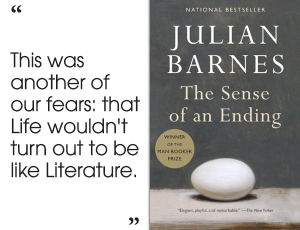
Posted by Lale on 24/2/2012, 0:07:37
Yes, I agree, some “original art” is not art and not beautiful and not smart. I don’t think creating disgust among the audience brings anything good. But some people do it, they can’t help themselves, they just want to be disgusting. I guess they have no other means of achieving brief fame and fame, no matter how infamous, is more important to them than love, respect, joy, knowledge, enlightenment or any of the other things the audience is looking for.
: Seems like people
: are struggling to be original
Some people are struggling to be original, but it (originality) comes naturally to others. And if you can be original and at the same time entertaining or beautiful or thought provoking or compelling or mysterious, or at least interesting, then you have achieved something.
And sometimes a good book is just a good book. Like Carter Beats the Devil by Glen David Gold, nothing special, just a good old-fashioned story.
I am amazed by some of the original thought I come across on a daily basis: jokes, word plays, some commercials (while others are idiotic), resourcefulness in the face of small obstacles…
With respect to the books we read, I didn’t mean to make any generalizations. I don’t expect all the books I read to be exceptional. And what I find exceptional others may not and vice versa.
I don’t like too much experimentation either, I am conservative that way. But I want to be impressed in some way.
I guess they have to experiment somewhat, otherwise nothing will ever change.
Enough with my random thoughts, sorry I rambled on too much, it is 1 am here, so good night
(I think we will come back to this topic when we are discussing Room.)
Good night,
~
Posted by Steven on 21/2/2012, 9:40:12
: I value originality, but I hate it when an author
: tries to sell crap disguised as creativity
It seems the more I read the less confident I feel in distinguishing between brilliance and crap.
Maybe originality is overrated anyway. I’ve been reading some early Greek prose works. The dating on these works is speculative, but Callirhoe by Chariton may be the oldest surviving work of literature that could legitimately be called a novel. It was written sometime between 50 BC and 200 AD, most likely around 100 AD. The plot is the story of a pair of lovers who are separated by mischance and meander all over the Mediterranean, victims of pirates, slave auctions, accidental burial, crucifixion, and war. There’s jealousy, seduction, piety, nobility, etc. It is marvellously entertaining and, to get to the point: timeless. Change the name of the deity and it could pass as a medieval romance from 1000 years later. Move the setting to the West Indies and it is a novel from the Romantic era. Replace triremes with spaceships and it could be a piece of pulp science fiction from the 1920s by Edgar Rice Burroughs.
: I will hide little confession here:
You’re not hiding it very well . Since you’ve already read it, I may go ahead and start it early, especially if the others are interested in doing so as well. Then maybe we can squeeze something else in during the month of March.
Other comments I’ve read indicate people are very impressed with Room, even if they found it a disturbing book to read.
: By the way, with my ladies reading group, we are
: reading Out Stealing Horses, which may be, I heard, a
: little like The Sense of and Ending and The Sea.
I may have been one to mention this, at least with regard to the similarities between Out Stealing Horses and The Sea. I read them the same summer. The basic themes are quite similar. Out Stealing Horses has more of an historical framework than the other two. In terms of writing style and depth it probably lies midway between the two. I hope you enjoy it.
~
Posted by Lale on 16/2/2012, 12:16:23
: Jokes? Did you read any jokes? What jokes? I don’t
: think I even smiled while reading this.
There were no jokes, you are right. I also didn’t think the loose ends were neatly tied up, the reader who made the list is wrong on those, but the list is still a pretty accurate and amusing. I found it very funny.
I have friends who loved the book.

Posted by Steven on 21/2/2012, 10:11:04
Getting back to the content of the novel itself, as usual I flagged a number of passages as I was reading it. The page numbers are from the US hardback edition and may not match what Lale and Guillermo were reading:
p. 36: “Adrian paused. He took a sip of beer, and then said with sudden vehemence, ‘I hate the way the English have of not being serious about being serious, I really hate it.’ In another mood, I might have taken this as a strike against the three of us. Instead I felt a throb of vindication.” (italics in original)
This comes after Tony introduces Veronica to his friends. Adrian’s statement seems to come out of the blue, and I’m not sure I understand the narrator’s reaction. As a generalization I suppose it’s true, but admittedly my knowledge of English manners is based entirely on movies and TV. I’ve never had more than a passing conversation with someone from England.
p. 43: “If you’ll excuse a brief history lesson: most people didn’t experience ‘the sixties’ until the seventies. Which meant, logically, that most people in the sixties were still experiencing the fifties…'”
This is very true. I don’t know how many times I’ve explained to younger people that most of what they think reflects the 60s is actually from the early 70s.
p. 48: “…mental states can be inferred from actions. That’s in history–Henry VIII and all that. Whereas in private life, I think the converse is true: that you can infer past actions from current mental states.”
Interesting but probably too oversimplified to be useful.
Same page: “You might think this is rubbish–preach self-justificatory rubbish. You might think that I behaved towards Veronica like a typical callow male, and that all my ‘conclusions’ are reversible. For instance, ‘After we broke up, she slept with me’ flips easily into ‘After she slept with me, I broke up with her.’ You might also decide that the Fords were a normal middle-class English family on whom I was chippily foisting bogus theories of damage; and that Mrs. Ford, instead of being tactfully concerned on my behalf, was displaying an indecent jealousy of her own daughter. You might even ask me to apply my ‘theory’ to myself and explain what damage I had suffered a long way back and what its consequences might be: for instance, how might it affect my reliability and truthfulness.”
Well, the author is obviously waving a flag saying “Unreliable narrator.” This begs the question, Is what we learn in the end the final answer? Is Tony lying to us about not having slept with Mrs. Ford? Is he really the father? Did Adrian suspect this? Is that why Tony is in the equation? Is that what Veronica suspects and why Sarah willed the diary to Tony?
p. 113: “Perhaps character resembles intelligence, except that character peaks a little later: between twenty and thirty, say. And after that, we’re just stuck with what we’ve got.”
Another gross oversimplification, but perhaps some truth to it. Scrooge wouldn’t agree with this, though.
~
Posted by Bob Kaplan on 6/6/2013, 10:48:51
“Blood money” bequeathed to Tony is so Sarah can assuage her guilt for warning Tony away from Veronica, as Tony points out she did in his letter. Sarah told Tony not to allow Veronica to “get get away with too much” and did not answer his question “what do you mean?” As he left the house, Sarah gave Tony a peculiar “horizontal gesture at waist level.” This was a dismissive signal to Tony that he should break it off with Veronica. He did so, with tragic consequences. Blood money to assuage Sarah’s guilt over possibly causing the tragedy is what that was about.
~
Posted by Lale on 6/6/2013, 16:35:35
Thank you Bob. Thanks for coming to ReadLiterature discussion forum. This was an interesting book and we are happy to have this new perspective.
Did you like the book, overall?
~
Posted by Bob Kaplanon 6/6/2013, 22:17:38
Yes, Lale, I enjoyed the book immensely. After reading it and “getting” most of it, but not being able to decipher the “blood money” reference, I awoke that night at 4 a.m. and went to the book. I then re-read the few scenes in which Tony and Sarah interacted directly, and came to the (my) solution. Later I read the prior commenter who pointed out that Tony’s own letter to Adrian specifically said that Mrs. Ford had warned Toney about her daughter. This nailed it down for me.
~
Posted by Lale on 8/6/2013, 18:24:52
: I awoke that night at 4 a.m. and went to
: the book.
That is the sure sign of a gripping book, if it wakes you up at 4 am in the book
There were a few books that have also kept me awake. That is actually what we really hope for in a book, when we first pick it up, that it should have such an impact on us that it keeps us awake at night, that we are so under the spell that we could not start another book right away. There were books that I had to, just absolutely had to, talk about all the time, to anyone I came across, for weeks.
We are very happy that you shared your experience and comments with us. Please keep checking our discussion board. We are a very nice bunch and some of us are very very good at analysis.
~
Posted by Seemaon 25/7/2012, 10:09:59
Hi All,
I am really late and I know you’ve all moved on from this book already. But I just finished it and read your (as always) insightful discussion and felt an urge to chime in.
Lale, I think I’m mostly with you on this book. I didn’t hate it but was definitely left ambivalent at the end.
Firstly, I am a little stumped by something else Sterling mentions in his first response to Lale in this thread (something that other reviewers elsewhere seem to have alluded to as well). Quoting Sterling: “One of the major revelations of the novel is that Tony is essentially a supporting character in the largest dramas of his own life. We all see ourselves as the protagonist. Imagine discovering that you’re a bit part! “
As much as I love that idea, I didn’t get that from this book at all. Quite the contrary actually. For one thing, right from the start, I got the sense that the narrator (warts and all) seems to believe that Adrian is quite easily the more fascinating character. Tony reduces himself and his 2 other friends to the sidelines as he paints this remarkable picture of Adrian when the boys first get to know and befriend him. [Side note: I really love those passages and the way Barnes has us buying into that image without having to say too much about Adrian. In that sense, I completely agree with Sterling that the book has but one character ultimately. Adrian is remarkable because Tony believes he is.]
But basically to me, the book plays out the other way around. Tony considers himself a “peaceable” personality, a benign rather mundane human being without too much agency. Someone who has a good relationship even with the ones he has perhaps hurt (his ex-wife and daughter) and seems to view himself as not noteworthy in any way.
However, reading the letter he sent Adrian and Veronica and seeing Adrian’s son forces him to reconcile his own role and responsibility in what happened to Adrian (and Veronica and Adrian’s son). Even if the letter was just borne out of the foolishness of youth, certainly the book has Tony acknowledging that he’s perhaps responsible for more than he was willing to accept earlier? He does say these lines a the end of the book, “There is accumulation. There is responsibility. And beyond these, there is unrest. There is great unrest.”
But my response to the book really isn’t entirely vested in whether Tony’s image of his role in the events goes from central to peripheral or the other way around. Just found it interesting that my reading seemed to go against most others.
On a positive note, I do admire Barnes for writing a relatively plot-driven book with a central mystery and yet leaving the ending fairly ambiguous. Given the slippery nature of the narrator and his memory, I don’t think we can really be certain that we and the narrator (and the truth) are aligned by the time we get to the line where the narrator claims to have finally “got it”. I liked that ambiguity and that the book allows for us to think about the pieces we’ve gathered and try and fit in our own narrative. Nice manifestation of what Barnes points out is a central issue with memory especially as we get older.
That said, there’s other stuff about the book that did turn me off (or I didn’t understand entirely):
1. The 500 pounds is essentially a MacGuffin and I’m okay with that. But to this date, I don’t understand Sarah’s decision to leave our narrator the money or the diary. It does feel like a plot device that’s necessary to propel the book and in that sense, I find it rather unsatisfactory a device.
2. The parallel between the schoolboy who commits suicide supposedly because he impregnated a young girl and Adrian’s suicide. Foreshadowing, maybe.. but felt forced to me.
3. While I’m okay with the book being more of a musing on memory and aging and the past and so on as opposed to carefully constructed complex characters, I didn’t really know what to make of the ending and how that comments on these themes.
I didn’t think that Tony’s letter (as cruel and insensitive as it was) was all that unusual or responsible for everything that ensued. Those other ppl seemed pretty damaged in their own ways to begin with and I feel pretty certain that Adrian and Sarah would’ve found each other with or without Tony’s help.
So if that’s the case, then am I to take away that even our small mistakes, thoughtless gestures of cruelty can have big consequences? Sure, maybe but again, I don’t see how we can avoid those. Is it then just a comment on human nature and how these things could accumulate (a word used often in the book) and turn into something dark and horrible?
Finally, a few of Tony’s musings I particularly liked / related to and made a note of:
“In those days, we imagined ourselves as being kept in some kind of holding pen, waiting to be released into our lives. And when that moment came, our lives – and time itself – would speed up. How were we to know that our lives had in any case begun, that some advantage had already been gained, some damage already inflicted?”
“When you’re young – when I was young – you want your emotions to be like the ones you read about in books. You want them to overturn your life, create and define a new reality. Later, I think, you want them to do something milder, something more practical: you want them to support your life as it is and has become. You want them to tell you that things are OK.”
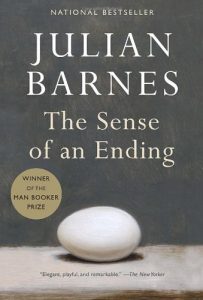
Posted by Sterling on 25/7/2012, 15:13:57
Seema,
It is exciting to have a new person contributing to our discussions. Again, welcome.
I will try to respond to your comment, although I feel a bit rusty on this novel.
Tony’s letter is central to the affair between Adrian and Sarah because Sarah, Adrian, and Veronica all believe it to be. This is made clear by Sarah’s bequest, Adrian’s formulas, and directly from Veronica. It may not have been that remarkable a letter (that is certainly debatable), but it had remarkably massive, if unintended, consequences. It’s essentially irrelevant whether Sarah and Adrian might have got together without Tony’s help. Tony was the agent (even if unintentionally), of the affair, the suicide, the birth of the handicapped child, all the tragic sequelae.
Again, this is all debatable, but my comment about Tony seeing himself as the bit player rather than the protagonist is based on how he frames his life. The story he has been telling himself is that he is a benign, harmless fellow, living a life that is comfortable and dull. He then discovers that others have seen him as a veritable Iago, author of the catastrophe that rocked many lives. The whole frame of reference shifts. The meaning of his life is different from what he has believed. A bit player because he only threw the match that exploded the lives of so many.
But what are we to take away from this? I don’t know. I don’t think that we are meant to take this as a cautionary tale. Perhaps the author means to shake us from our own complacency. Most of us, I think, have a well-worn sense of our own identity, constructed of a familiar narrative that we tell ourselves. Barnes may intend to help us realize that our narrative is not the only possible narrative associated with our lives. There are other narratives, maybe “dark and horrible,” maybe not, that are equally valid and that would illuminate one’s life in a completely different manner.
PS – Not Adrian and Veronica’s son, it’s Adrian and Sarah’s son. Veronica’s half-brother.
~
Posted by Guillermo Maynezon 25/7/2012, 17:31:59
Who knows what parts we have played in other people’s lives? There are people whom we can be pretty sure how and how much our actions have affected. But not even that. Perhaps our brother or sister carry in their hearts forever some cruel action or remark, that have made them feel inferior, and they may carry that feeling even if on the surface they do love us; or maybe some former work acquaintance fondly remembers us for some support we gave them that propelled their self-assuredness etc.
There is an image we have of ourselves, and we tend to like to have it as a good, peaceable one (unless we delight in cruelty and the exercise of power). But there is no way we can ascertain our impact in the lives of every individual whose path in life crosses ours. Of course, we may think that first girlfriend has been deeply impacted by us, when she barely remembers the days…
I think that is one valuable thing about this novel, otherwise not Barnes’s best.
~
Posted by Seemaon 25/7/2012, 18:00:54
Hi Sterling,
Thank you so much for your thoughtful response even after all this time!
Based on this follow-up, I think we are on the exact same page with respect to Tony’s role. He considered himself a bit player but turned out to perhaps unwittingly to be the villain or at least a lead player. I was thrown off I think by this comment you made in your initial post,
” We all see ourselves as the protagonist. Imagine discovering that you’re a bit part!”
I misread that as your reading of Tony’s dilemma but now I think we both agree that Tony actually prefers to see himself as the latter. That was one of the things I liked about the book. Most fictional leads / narrators are so narcissistic whereas Tony necessarily plays himself as benign and uninteresting.
I also like the conclusion you (and Guillaume in his follow-up post) draw there. I don’t think there’s any point to reading it as a cautionary tale either but it does speak to the very Rashomon-like nature of our own life stories which we think we know so well. A different narrator, a different lens could cast the whole thing and our own sense of selves in such a different light. Brr, scary .
I still don’t like it as much as Arthur and George or Flaubert’s Parrot but this exchange does make me like it a bit more .
- Related:
- Book Reviews


